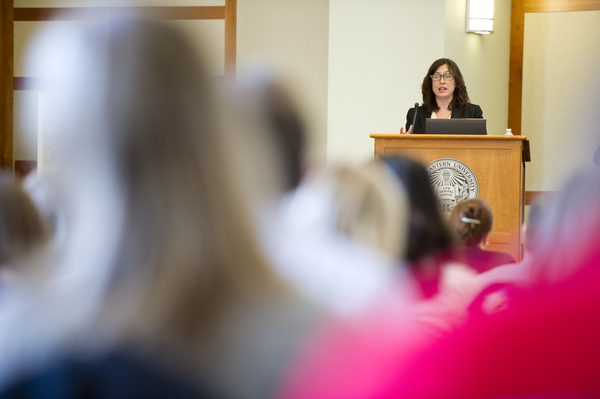Policy’s role in philanthropy

Philanthropic organizations have long fostered social change through grants targeted at specific causes. But when philanthropy is not enough, public policy can play an important role in the humanitarian effort, according to speakers at a conference held Monday at Northeastern.
“We have to remind ourselves the American middle class didn’t just happen; it was built,” said Tamara Draut, vice president of policy and research at Demos and the author of Strapped: Why America’s 20- and 30-Somethings Can’t Get Ahead. “Laws flowed from the agreed-upon standard that Americans, through hard work, should have a shot at the middle class.”
Draut delivered the keynote address at the second annual conference hosted by Northeastern Students4Giving, which was titled “Moving the Needle: Philanthrophy’s Role in Policy, Advocacy, and Systems Change.”
She noted that a middle class that had created generations of prosperity slowly began to dissolve in the 1970s, pointing to a concerted effort to promote trickle-down economics, increased lobbying by big business, and a major influx of cash from wealthy Americans into the political system. This trio of occurrences, she explained, has created a nation where philanthropy alone cannot solve issues like poverty and inequality.
“All of these constrain our ability to use policy to make meaningful social change,” Draut said.
The event—held in the Curry Student Center Ballroom—was sponsored by the Arthur K. Watson Charitable Trust and presented in partnership with Associated Grant Makers and the Learning by Giving Foundation. It convened nonprofit and community leaders, social entrepreneurs, students, and faculty to examine opportunities and strategies for philanthropists to support social impact funding and other work directed at policy, advocacy, and systems change.
Northeastern Students4Giving, housed within the university’s human services program, is an experiential philanthropy education program that enables students to make a positive and lasting impact in Boston’s neighborhoods through grant making. The program, which combines academics with real-dollar grant making, teaches students about the socioeconomic role of the nonprofit sector and philanthropy in American society; fosters leadership and innovation in these areas; and helps promote a campus-wide culture of giving.
“We have to step back to look at the big picture and see if there are bigger levers, such as policy, that we can focus on,” said Rebecca Riccio, the Northeastern Students4Giving program director, in her opening remarks.
The conference drew students from seven universities and featured a variety of speakers throughout the day, including Massachusetts Lt. Gov. Tim Murray.
Joan Fitzgerald, interim dean of the School of Public Policy and Urban Affairs, noted that the idea of student involvement in philanthropy, paired with a focus on public policy interventions, fits snugly into Northeastern’s unique approach to education.
“Whether engaging in philanthropy, working all over the globe on co-op or through internships, or conducting research with faculty, experiential learning is what we do at Northeastern,” she said.





